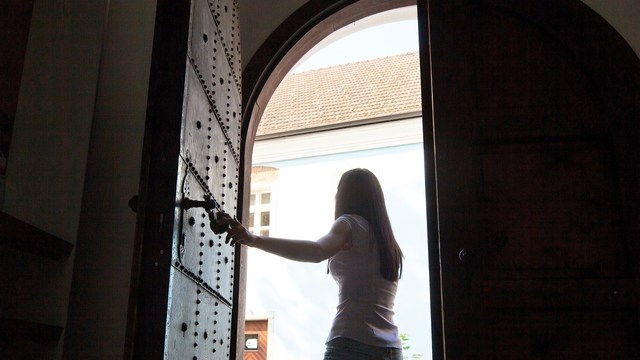 Erwin Wodicka/PhotoSpin
Erwin Wodicka/PhotoSpin
Jessica Yaffa spent years trapped and frightened in a marriage dominated by violence, sexual abuse, intimidation and manipulation. She finally got out with her young son, and lived -- barely -- to tell the tale.
After suffering rape and attempted murder at the hands of her now ex-husband (who is serving a lengthy sentence for his crimes), she has taken her suffering and turned it into a cause.
Her mission is to prevent other women from going through what she did. And if they suffer as she did, she’s here to help them get their lives back.
I had the pleasure of talking to Jessica recently about her life as a survivor of near-lethal domestic and sexual violence. She spoke about her role now as author and advocate for those still trapped in dangerous and destructive relationships.
I sent her some questions which she answered in the same frank and honest manner as I heard when talking to her via phone.
EmpowHER:
Jessica, it seems like you came from a loving, caring family but you had low self-esteem. Where you do think your lack of self-confidence/esteem came from and how was your ex able to capitalize on it?
Jessica:
It is important to recognize that many young women that come from what seem to be "normal" homes struggle with significant issues regarding their self-esteem. In my particular case, I grew up in a home where I was constantly striving to win my father's approval, often falling short.
Because I experienced his disapproval around my school performance, choice in friends, clothes I wore, and sassy attitude, I began to internalize this as meaning I was unworthy of love, or unaccepted for who I was.
EmpowHER:
When did you realize your marriage had become dangerous?
Jessica:
I was "walking on eggshells" for years before my marriage actually became physically dangerous. I met my ex-husband in high school, and while he was altogether charming, he was also manipulative, controlling, and possessive ... a combination that felt all too good to a young woman starving for attention.
I knew it was time to go when the emotional abuse transitioned into daily physical assaults as well. This particular pattern began when my son was about 4 months old.
EmpowHER:
In the aftermath of your ex's sentencing, you chose to go public instead of quietly going on with your life. Why?
Jessica:
It wasn't immediately after he was sentenced that I chose to speak out, in fact it was years later.
Once I grew to a place in my own healing where I was able to shed the shame, guilt, and self-judgment I had been walking around with for years, I recognized I had an opportunity to use my experience in order to change the lives of many, while also advocating for change around the way we address issues of domestic violence.
In this process, what was meant for tragedy has become triumphant.
EmpowHER:
What was the reaction to your book, "Mine Until"?
Jessica:
This is a loaded question. Some of my family struggled with the development of this book because they feared for my safety as well as their breach of privacy, while others shared in my conviction to publish it.
Once it was released I began getting daily emails and social media posts from men and women around the country regarding the way it was impacting them.
They no longer felt alone or ashamed, some were able to find forgiveness, others understood the dynamics of domestic violence in a way that had never been able to before, while a few had stayed up all night to finish the book in less than 24 hrs because of its compelling nature.
These moments were when I knew I had done the right thing.
EmpowHER:
Domestic violence is misunderstood in America, even today. What misconceptions do you want to change?
Jessica:
Domestic violence is an issue that affects us all ... rich or poor, brown or white, educated or not. With 1 in 4 women being victimized in their lifetime, we each have a personal responsibility to take a stand for what is intolerable.
If you are fortunate enough to not be personally affected, be mindful that your mother, sister, daughter, co-worker, or best friend will be, and it is for her that you must invest in eliminating the stigma, shame, and judgment that continues to exist for survivors around the globe.
It is equally important that we recognize that men are victims as well, and until we create a safe space for them to come forward, they are left to suffer in silence.
Lastly, this movement to end domestic violence is not just about addressing violent behavior. It is about offering each person the opportunity to identify their value and worth separate from relationship and despite their circumstances.
As we step forward in our truth and shed feelings of anger, shame, judgment, neglect, betrayal and unhealthy modeling, we all have the ability to be a safe, respectful and trustworthy partner as we enter into relationships.
EmpowHER:
You have set up an innovative rehabilitation center for women and others who have survived domestic violence. Can you tell us more about your mission? How can people find you?
Jessica:
Yes, we have. The Restoration Inn is a treatment residence that offers women an opportunity to heal the underlying trauma that often contributes to substance misuse. Our program is a place where women are met with compassion, grace, understanding, and intention.
The primary goal is to offer them intensive therapeutic and holistic support in order to allow them to experience full recovery both from the relationship trauma and substance abusing behaviors.
More info can be found at www.PracticalRecovery.com.
EmpowHER:
October is National Domestic Violence Awareness Month. Why is it so important that we keep learning about this often hidden crime? What message is most important to get across to people, young and old, about this kind of abuse?
Jessica:
Every nine seconds a woman is physically beaten by her intimate partner in this country. We must stand together in this call to action in order to create change around the way we talk about, react to, and address domestic violence.
The epidemic of domestic violence is a solvable issue if we all invest in affirming one another's worth, while providing support, prevention, intervention, and education anywhere and everywhere we have the opportunity to do so.
* * * * * * * *
When I talked to Jessica by phone, it was clear to me that she is keenly aware that this kind of violence affects children, too. Her own son, mercifully young when removed from his father’s abuse, was still not young enough to escape the trauma and memories his childhood with his father caused.
He had nightmares and referred chillingly to his old home as the “Dark House.” Jessica, so used to being demeaned and violated by her husband, overcompensated with her son to the point of not guiding him the way a young child needs.
She was overly permissive, and reluctant to discipline ordinary childhood mistakes and negative behaviors. Her son had been treated badly enough, she felt, and only needed praise.
A mistake, Jessica says, looking back on it. He had no boundaries, but with time, and a revisionist plan on parenting, he became the strong and wonderful college student he is today. His bad memories faded and the nightmares stopped. Images of the Dark House ended and a new life began.
On the phone, Jessica’s voice warms audibly when she considers the boy then and the young man today. He found a positive male role model that Jessica felt vital to his well-being but she never made any decisions about his contact with his father. That, she felt, was up to her son.
He did make contact but over the years felt that it was better to make a permanent break. Jessica doesn't comment as to whether she thinks this is a good or bad thing, only that it was a decision her son made. Removing herself from this choice enabled her son to have control over his life -- something his father robbed from his younger years.
And that positive role model for her son? Jessica went on to marry him, learning to trust him -- and more importantly herself -- that this marriage was right for her.
Was she nervous at first, I asked? She makes no bones of it -- she was terrified. After accepting the proposal, she second-guessed everything. Panic attacks and insomnia ensued. Her fears swallowed her.
Her husband would live with her and see her for what she really was -- weak, filled with flaws and unlovable. Worthy of any abuse thrown at her. And he’d regret marrying her after seeing the real Jessica.
But these words and feelings were those of her former husband, the master manipulator who made it his life's work to dominate her until she felt as worthless as he told her she was.
Coming out of that mindset was hard. Believing she was a good, worthwhile human being was something that had to be reprogrammed into an abused brain but therapy, and a lot of honest talked with her fiance, got her though.
Now happily married for five years, she says she had to realize that her relationship with this man was a journey and always would be. The destination was less important. That journey continues, with reminders of kindness on both sides and the day-to-day communication that makes it work.
I asked Jessica if she had post-traumatic stress disorder and she readily told me that indeed she had been diagnosed with this. She wants other abused women and men to know that her panic attacks, her wild thoughts and detailed plans to flee should her husband somehow get free and show up at her door, are normal.
She planned for every scenario, from her husband getting out, to his potential escape from prison or any factor that could place him in front of her.
When, in real life, he ended up on life support after a prison riot, she was informed by the prison system that he was likely to die. Yet her panic rose again, envisioning him attacking her even with unusable body parts, in random places or without limbs.
But she assures women that these are not crazy thoughts, nor are they really irrational. When someone (like Jessica) narrowly escapes attempted murder, these thoughts are real and, she emphasizes, shame-free.
Shame is a big no-no with Jessica. She has no time for it. Survivors have nothing to be ashamed about, should shoulder no blame and should never beat themselves up for what happened. The beatings have come to an end.
Many women flee from abuse and disappear into life, wanting desperately to never think about it again. And can anyone blame them? That in itself, takes near superhuman strength and anonymity is often the safer option.
And then there are others like Jessica who turn their own nightmares into advocacy for others. They go for it -- stick their necks out, face their fears and do whatever they can to shout from the rooftops about ending domestic violence. This, they know, is the only way to end the generational cycles of domestic terror.
Jessica is warm and intelligent. Her voice speaks with knowledge only a domestic violence survivor knows. She makes no judgments and there is no bitterness in her voice. In fact, there is a sense of peace in her tone.
Mostly there is strength. And finally, power. She has made things better for herself and her son. And if you are a victim or survivor of domestic violence, she can make things better for you too.
Jessica’s website can be found here and she's on Facebook.
Her book, "Mine Until: My Journey Into and Out of the Arms of an Abuser," can be found on her website, at Amazon.com and at Barnes & Noble as well as most other book sellers.
Jessica travels throughout the United States, speaking about her experiences and educating others. You can find her schedule on her website.
Reviewed October 15, 2014
by Michele Blacksberg RN
Edited by Jody Smith




Add a CommentComments
There are no comments yet. Be the first one and get the conversation started!